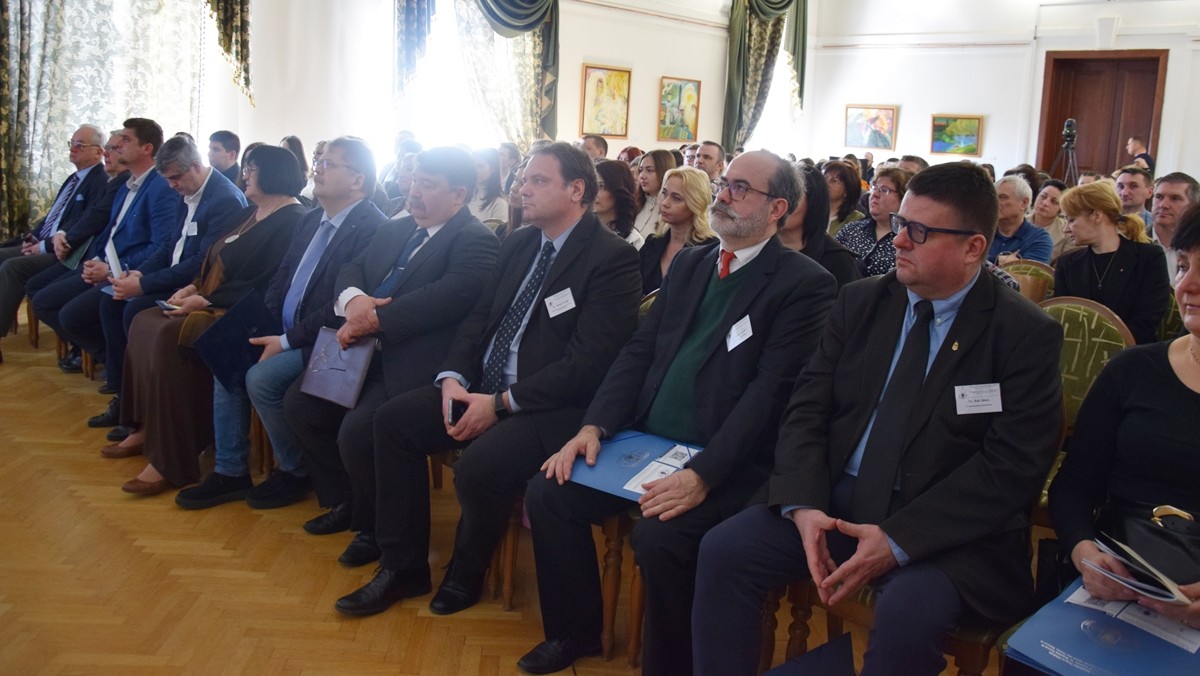The 4th International Scientific and Practical Conference “Digital Economy and Sustainable Development: Emerging Trends in Finance, Accounting, Management and Socio-Behavioral Sciences”
On March 26-27, 2024, the Department of Accounting and Auditing of the Ferenc Rakoczi II Transcarpathian Hungarian College of Higher Education (FR II THCHE) in collaboration with partners conducted the IV International Scientific and Practical Conference “Digital Economy and Sustainable Development: Emerging Trends in Finance, Accounting, Management and Socio-Behavioral Sciences“. The event was dedicated to the celebration of “Rakócsi Days”.
The conference aimed to facilitate the exchange of experience and scientific research within the framework of the department’s scientific initiative on “Functioning of the system of finance, accounting, and taxation under the influence of global factors on innovative economic development”. It covered issues related to the latest trends in accounting, finance, business economics, management, marketing, and social and behavioral sciences within the broader context of implementing the digitalization strategy of the economy during the era of Industry 4.0, with the involvement of well-known international experts in interdisciplinary fields.
The conference was structured around five primary themes:
- Digital economy and sustainable development at the macro, meso, and micro
- Prospects for the development of accounting, taxation, analysis and auditing in the conditions of digitalization of the
- Digital transformation in finance, banking, insurance and the stock market: innovation and sustainable development.
- Innovative management and marketing in the context of the latest economic
- Social and behavioral sciences in the context of economic transformation.
The conference saw the participation of 240 attendees, including scholars from Ukrainian and foreign higher education institutions (44 of whom were Doctor of Science degree holders, including 18 heads of departments, and 85 were PhD candidates), as well as doctoral students, postgraduates, and other interested individuals. Representatives from 85 scientific, educational, and practical institutions from Ukraine, Hungary, Slovakia, Romania, Malaysia, India, Iraq, Thailand, and Turkey were present offline and online.
During the conference, lively discussions took place among participants during plenary sessions and panel discussions in sections.
The involvement of both domestic and international researchers and practitioners facilitated the exploration of a broad spectrum of pertinent topics. These included examining the ramifications of digital transformations on sustainable development, analyzing the innovative practices of industrial enterprises within the framework of national sustainable development policies, leveraging digital tools for environmental crime prevention, assessing the dynamics of the IT industry amid economic instability, investigating the correlation between Central European trade routes and the revenues of EU member states, refining strategic management approaches for enterprises within the context of sustainable development, formalizing the development processes of e-sports through a structured system encompassing game “developers/publishers, e-sports events, and e-sports disciplines”. Additionally, discussions encompassed trends in non-financial reporting within the EU, notably the emergence of CSRD and the mandatory confirmation of reporting, examining the role of accounting systems in organizational legitimacy within the context of sustainable development, evaluating the efficacy of digital accounting and audit procedures on tax collection, expanding the utilization of generative artificial intelligence in the management processes of small and medium-sized enterprises in Hungary, utilizing ESG reporting as a tool for sustainable development management, exploring preventive and reactive approaches to public finance management through planning and control measures, providing accounting and analytical support for the sustainable development of service sector enterprises, studying the impact of artificial intelligence on accounting practices, investigating fundraising as a means of fostering development and rehabilitation for domestic enterprises in the post-war era, assessing auditing practices in Ukraine amidst digital transformation, exploring the influence of digital economy development on accounting methodologies, understanding the requirements of international standards for financial monitoring of cross-border payments, examining the BRRD European Directive and its implementation process in Ukraine, managing investments in the digital sphere, analyzing the language landscape and its implications on the economy, with a specific focus on Romanian and Hungarian settlements in Zakarpattia, and delving into the human factor within information security, among others.
The conference was attended by bachelor’s and master’s students who are members of the scientific circles “Research of accounting, financial and economic aspects of the functioning of economic entities at the micro-, meso- and macroeconomic levels” and “Development of accounting, analysis, audit and improvement of taxation in in the context of Ukraine’s integration into the international community”, respectively. The participants showcased their abstracts covering pertinent subjects such as: theoretical frameworks for delineating economic cycles, target costing and kaizen costing methods in managing enterprises, treatment of enterprise fixed assets within accounting, the fundamental nature of export operations in accounting, foreign economic activity as an accounting entity, classification of goods as per national and international accounting standards, the economic fundamentals of production processes, enhancing enterprise accounting strategies for tax optimization, and more.
An important outcome of the international scientific and practical conference was the unification of researchers and scholars of various backgrounds. Participants exchanged valuable experiences, which will contribute to the advancement of the digital economy and sustainable development in finance, accounting, management, and social and behavioral sciences in Ukraine and other countries, thereby emphasizing the importance of scientific communication in modern society.
The conference organizers are sincerely grateful to all participants who shared the results of their scientific research and actively participated in the conference proceedings.
-
This article is also available in
Українська

